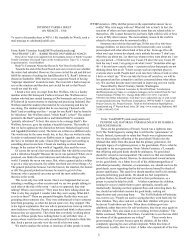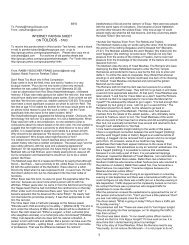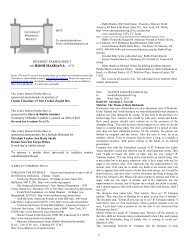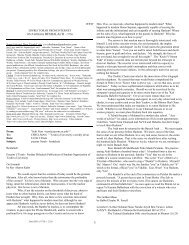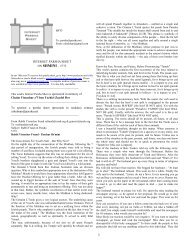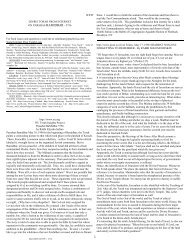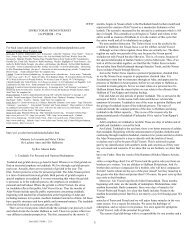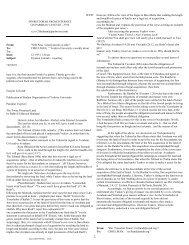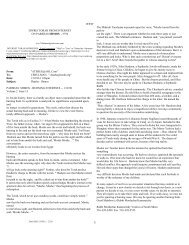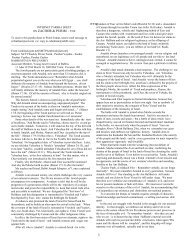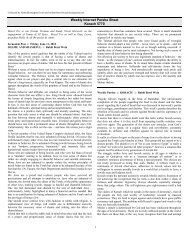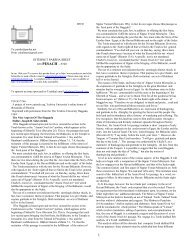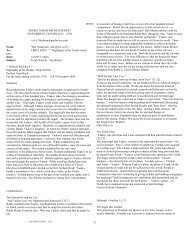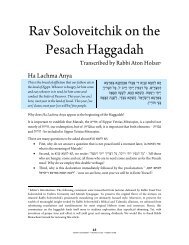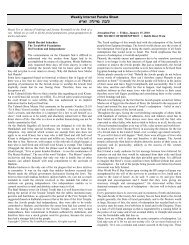ON PARSHAS TAZRIA-METZORA - 5756 - Internet Parsha Sheet
ON PARSHAS TAZRIA-METZORA - 5756 - Internet Parsha Sheet
ON PARSHAS TAZRIA-METZORA - 5756 - Internet Parsha Sheet
Create successful ePaper yourself
Turn your PDF publications into a flip-book with our unique Google optimized e-Paper software.
must pronounce the Metzora pure. A Metzora of limited financial means may<br />
substitute lesser offerings for the more expensive animals. Before a Kohen<br />
diagnoses that a house has Tzara'as, household possessions are removed to<br />
prevent them from also being declared ritually impure. The Tzara'as is<br />
removed by smashing and rebuilding that section of the house; if it<br />
reappears, the entire building must be razed. The Torah details those<br />
bodily secretions that render a person spiritually impure, thereby<br />
preventing his contact with holy items, and how one regains a state of<br />
ritual purity.<br />
Commentaries<br />
WHO'S FIRST?<br />
"When a woman conceives..." (12:2)<br />
If Man is worthy - if he makes his soul the essence of his being - then he<br />
precedes all Creation. For it was the spirit of Man that hovered over the<br />
depths even before the creation of light. But if he is not worthy - if he<br />
glories in his physical dimension - then in terms of the physical<br />
precedence of Creation, even the mosquito preceded him...<br />
For this reason the Torah deals with the laws of purity in Man after the<br />
laws of purity in animals: Just as the physical creation of Man follows<br />
that of the animals, so his laws are explained after the laws of the<br />
animals. This applies only when man behaves as nothing more than a<br />
sophisticated animal. However, if man relegates his physical side to his<br />
soul; if he fulfills the purpose of Creation by recognizing and serving his<br />
Creator, then he precedes all Creation.<br />
(Based on the Midrash and Rashi)<br />
TWO SIGNS<br />
"And on the eighth day, the flesh of the foreskin shall be circumcised."<br />
(12:3)The greatness of Shabbos can be seen from the fact that a boy is not<br />
given Bris Mila until he is eight days old - until he has experienced Shabbos.<br />
In other words, the reason that Bris Mila is performed on the eighth day<br />
after birth is so that the he can experience Shabbos before the Mila. Only<br />
by passing through the holiness of Shabbos, can he reach a level where he<br />
becomes fit to enter into the holiness of the Jewish People through Bris<br />
Mila. (Yalkut Yehuda)<br />
MORE THAN SKIN DEEP<br />
"And on the eighth day, the flesh of the foreskin shall be circumcised."<br />
(12:3) The custom at a Bris is to say to the parents "Just as he has been<br />
brought<br />
into the Covenant (Bris), so should he be brought to Torah, marriage and<br />
good deeds." Just as he has been brought into the Bris, which is now an<br />
inseparable part of him, thus also should all the other mitzvos of the<br />
Torah form an inseparable part of him. (Iturei Torah)<br />
STICKS AND ST<strong>ON</strong>ES<br />
"And he shall be brought to the Kohen." (14:3)<br />
When a person speaks Lashon Hara, it indicates that he has no concept of<br />
the power of speech. It shows that he considers words to be insignificant<br />
in comparison to actions: As the nursery rhyme says "Sticks and stones may<br />
break my bones, but words will never harm me." Nothing could be further<br />
from the truth. When a person speaks evil he awakes a prosecutor in Heaven<br />
not only against the target of his Lashon Hara, but also against himself.<br />
An angel with a `tape-recorder' stands by the side of each one of us<br />
recording our every word.<br />
In order to teach those who speak Lashon Hara the power of just one word,<br />
the Torah instructs that the offender be brought to the Kohen. But, even<br />
as he is on his way to the Kohen, his body covered with Tzara'as for all to<br />
see, until the Kohen actually pronounces the word "Impure!", he is still<br />
considered totally pure. Similarly, he cannot regain his former status,<br />
even though his disease has healed completely, until the Kohen again<br />
pronounces him to be spiritually pure. From this the speaker of Lashon<br />
Hara is taught to reflect on the power of each and every word. For with<br />
one word, he can be made an outcast, and with one word he can be redeemed.<br />
(Based on Ohel Yaakov)<br />
Doc#:DS3:217355.1 2331<br />
2<br />
Haftorah: Rosh Chodesh - Yishayahu 66:1-24<br />
When Rosh Chodesh occurs on Shabbos, the regular Haftorah is replaced<br />
by a special Haftorah - the last chapter of the Book of Yishayahu (Isaiah).<br />
This chapter was chosen because of its penultimate verse which links<br />
Shabbos and Rosh Chodesh: "And it shall be that, from New Moon to New<br />
Moon, and from Shabbos to Shabbos, all flesh shall come and prostrate<br />
themselves before Me, said Hashem. (66:23) This verse is also repeated<br />
after concluding the reading of the Haftorah.<br />
Every New Moon is a summons to Israel to renew and rejuvenate itself.<br />
Every Shabbos is a call to show practical proof of our homage to Hashem by<br />
ceasing from melacha (prohibited work). But there will come a time when<br />
not only Israel will be called to offer their willing service to Hashem...<br />
"And I will establish a distinctive sign amongst them and send refugees<br />
from them to the nations to ...Yavan, to the most distant lands that have<br />
not heard My Fame, nor have seen My Glory, and they will inform the<br />
nations<br />
of My Glory." (66:19)<br />
Yavan/Greece is the nation charged with the task of elevating the lowly<br />
and<br />
un-refined nations through culture. But culture is not an end in itself.<br />
It is only a preliminary stage. After Yavan/Greece, it is Shem/the Jews<br />
who will show mankind the path to elevate itself to an awareness of what is<br />
good and true; to pay homage to what is morally beautiful; to lead the<br />
nations to the height of Man's calling.<br />
The `uniformity' in thought that rules the actions and intellect of Greece<br />
is ultimately a fulfillment of Hashem's plan. For through this love of<br />
uniformity, the nations will be united and they will finally come to<br />
perceive the `One-ness' of the Creator.<br />
This unified mankind will become the encircling vessel that will contain<br />
the pure mincha offering that is the Jewish People. Then the nations will<br />
recognize Israel's role as the priests of mankind, just as the Levi'im are<br />
the priests of Israel.<br />
The realization of this goal is something absolutely certain. Then every<br />
New Moon and every Shabbos will not only bring to Israel a call for renewal<br />
of kedusha (holiness) of acknowledging Hashem in free-willed devotion, but<br />
all mankind will also hear and heed this call. (Adapted from Rabbi S. R.<br />
Hirsch)<br />
Sing, My Soul Insights into the Zemiros sung at the Shabbos table<br />
throughout the generations.<br />
Tzur Mishelo Achalnu - The Rock, from Whose food we have eaten<br />
Yibaneh hamikdash, ir Tziyon t'malay, v'sham nashir shir chadash<br />
"May the Sanctuary be rebuilt, the City of Zion replenished and there shall<br />
we sing a new song."<br />
The Midrash calls attention to a connection between the rebuilding of<br />
Jerusalem and the songs of praise sung by Israel to its G-d. In Tehillim<br />
147, which we say each morning, we quote King David's words that "it is<br />
good to sing to our L-rd ... Hashem builds Jerusalem and gathers in the<br />
dispersed of Israel." Jerusalem, concludes the Midrash, will only be<br />
rebuilt with the praise and zemiros we sing to Hashem.<br />
There is also contained in this phrase the idea that when the final<br />
redemption takes place none of the old songs will be adequate for<br />
expressing our joy and a "new song" will have to be composed.<br />
Our singing of zemiros today is only a rehearsal for the "new song" which<br />
will herald the rebuilding of the Beis Hamikdash, soon in our days.<br />
Written and Compiled by Rabbi Yaakov Asher Sinclair<br />
General Editor: Rabbi Moshe Newman Production Design: Lev Seltzer<br />
(C) 1996 Ohr Somayach International - All rights reserved.<br />
"Dovid Hoffman " " ravfrand@torah.org"<br />
"RavFrand" List - Rabbi Frand on <strong>Parsha</strong>s Tazria-Metzorah -



